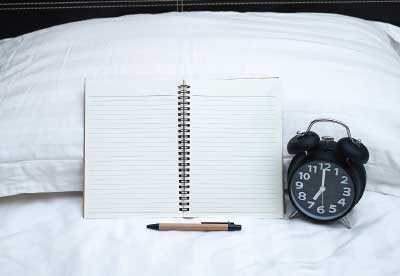Just as thin people sometimes view themselves as overweight, people who sleep well may complain of chronic insomnia. Self-described poor sleepers often experience depression, anxiety, low self-esteem, and impaired daytime functioning.
Nearly 30 percent of people who complain of poor sleep quantity or quality sleep well, as documented by self-reported daily sleep diaries, Joshua Tutek, M.A., of the University of Alabama, Tuscaloosa, reported at the annual meeting of the American Academy of Sleep Medicine and Sleep Research Society this past summer. Tutek is a psychology doctoral candidate.
These individuals, Tutek said, often assert that poor sleep undermines their social lives, work, or other aspects of daytime performance.
Some endorse an “insomnia identity”—a name coined by Tutek’s academic advisor, Kenneth L. Lichstein, Ph.D., a professor emeritus of psychology at the University of Alabama and director of the university’s long-running Sleep Research Project.
These people say “I am an insomniac,” rather than “I have insomnia,” Lichstein told Psychiatric News. The first suggests a durable trait conceptualization, he said, while the latter suggests a more pliable state.
In a review published in Behaviour Research and Therapy last year, Lichstein described studies dating back to the 1990s that evaluated sleep and sleep complaints independently. These studies distinguished four types of sleepers: complaining good sleepers, complaining poor sleepers, noncomplaining good sleepers, and noncomplaining poor sleepers. These studies found, Lichstein said, that sleep complaints are tied to greater daytime impairment than poor sleep itself.
In his recent study, Tutek sought to isolate factors that characterize people who embrace an insomnia identity (people who claim to have chronic insomnia despite objective evidence that the quantity and quality of their sleep fall within normal limits). He analyzed archival sleep survey data, which were collected in the Memphis, Tenn., area between 1997 and 1999.
In that survey, Lichstein and colleagues used random-digit dialing to recruit community-dwelling adults who reported sleep and daytime functioning via questionnaires and kept sleep diaries for two weeks. Subjects were stratified by age and sex to include at least 50 men and 50 women in each decade of life, from their 20s through their 80s. Nearly 800 subjects completed the study. The study was supported in part by the National Institute on Aging.
In his study, Tutek excluded subjects who reported sleep problems other than difficulty falling asleep or staying asleep that had persisted for at least six months. Of his final sample of 608 participants, 200 complained of poor sleep. Of those 200 participants, 69 (nearly 30 percent) provided daily sleep diaries showing they typically fell asleep within 30 minutes of bedtime and awakened infrequently.
People who complained of poor sleep despite sleep diary reports to the contrary, Tutek found, had higher depression and anxiety scores on standard tests and more medical conditions than those who did not complain about their sleep. People in poor health, he said, may reflexively assume they also sleep poorly.
Eighty-eight subjects (15 percent) took longer than 30 minutes to fall asleep and spent more than 30 minutes awake at least three times a week but did not complain about their sleep or report daytime impairment. About half of the study’s participants slept well and had no complaints, while about one-fifth accurately reported they slept poorly.
African Americans who slept poorly complained less about their sleep than Caucasians did. Cultural factors, Tutek noted, may affect how people perceive, self-evaluate, and perhaps even report insomnia.
Clinicians often make a diagnosis of insomnia based on a patient’s self-report at a single time, Tutek said. As a result, he said, some patients receive prescriptions for medications to correct sleep deficits they do not have.
Instead of prescribing medication, at least initially, he suggested, clinicians might ask a patient to keep a sleep diary for two weeks. Sleep diary forms are
available free.
People manifesting an insomnia identity, Tutek said, may benefit from psychotherapy targeting negative self-beliefs about sleep and health.
Rachel Manber, Ph.D., a professor of psychiatry and behavioral science at Stanford University School of Medicine, concurred with this approach.
Thinking of oneself as an insomniac can affect behaviors, Manber told Psychiatric News. She is the director of Stanford’s Sleep Health and Insomnia Program and cowrote the book Treatment Plans and Interventions for Insomnia.
People who see themselves as insomniacs commonly attribute poor performance in life tasks to poor sleep, Manber noted. They may engage in counterproductive behaviors focused on getting more sleep, such as going to bed before they feel sleepy or staying in bed long after awakening in the morning. Conversation exploring mistaken notions about sleep, she said, may help them assess their sleep more accurately. ■
The review by Lichstein, titled “Insomnia Identity,” can be accessed
here.

